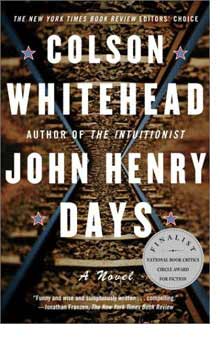| |
|
|
 |
 |
|
 |
| |
What's New Archives
Ogun and John Henry
Read Victoria Hippard's dissertation on Ogun, a Possible Ancestor of John Henry, the Steel-driving Man? (PDF, 18 KB)
Although exact dates for the beginnings of worship of Ogun are unavailable, Sandra Barnes believes that [...] many of the themes surrounding Ogun are rooted in a set of Pan-African ideas that probably accompanies the spread of iron-making technology throughout sub-Saharan Africa as far back as 2,000 years. (The Many Faces of Ogun 4). She tells us: "Clearly the god Ogun existed, [...] before the 1700s in the West African societies whose peoples contributed to the slave diaspora, or he could not have as emerged as strongly as he did in Haiti and elsewhere in the new world." (5) She further states that: "Ogun was one of many deities carried to the New World by Africans during the slave diaspora which took place between the sixteenth and mid-nineteenth centuries" (1). It is my impression that the worship of Ogun was an integral part of the culture in West Africa and that some significant memories and aspects of Ogun worship survived in the New World.
 John
Henry - Words and Music from the Max Hunter Folksong Collection
John
Henry - Words and Music from the Max Hunter Folksong Collection
This link was submitted by Dr. John Garst and this is what he has to say about the Max Hunter Collection's version of John Henry:
"[This version] strikes me as stylistically unique. It is rather slow, and the
tune used by Wise Jones is a variant of the usual one. It is sung in
a tender, lamenting style, which is quite a contrast to the styles of
blues singers, hillbilly bands, and especially to bluegrass
renditions such as Bill Monroe's. The only other stylistic
approximation to this that I know of is the recording by Fiddlin'
John Carson (believed to be the first recording of this ballad), but
Fiddlin' John's singing, while moderately slow, is not at all tender
like Jones'."
|
|
| |
 John
Henry Days By Colson Whitehead John
Henry Days By Colson Whitehead
This is a fantastic book that was named one of the best books
of the year by Salon Magazine
Here is Salon's review:
John Henry was a late 19th-century folk hero, a hammer-wielding
railroad worker of towering strength who challenged a steam drill
to a steel-driving race and won. J. Sutter is a hack journalist
halfheartedly going for the "junketeering" record by racking up
the most consecutive days of scamming free food, drink and other
perks. John Henry inspired a legendary ballad. J. gets hired by
travel Web sites to write up festivals celebrating commemorative
stamps -- in this case, one honoring John Henry. Colson Whitehead's
brilliant, restless novel is about what happens when a cynical,
opportunistic, media-steeped product of the Information Age gets
rubbed up against the mythic dignity of America's past. What does
it mean to strive for something bigger than yourself in a world
where one of your friends loses his eye to another writer's finger
in "a tragic ironic quotes accident"? The fact that both the old-time
hero and the present-day freelancer are black only complicates and
enriches the novel's wit. Yes, Whitehead writes about race in a
way that feels entirely fresh, but then, he writes about everything
else that way, too.
Read Salon's full
review of John Henry Days |
|
| |
|
|
| |
|
|
 |
 |
 |
| |
|
|
| |
|
|
| |
 John Henry Stamp
John Henry Stamp
United States
of America Scott 3085 : "John Henry ", 1996 Stamp design © 1995, United
States Postal Service
It was Henry's indomitable courage and passion that lived on in song.
The determination of the working man and woman who defied dehumanization,
even death, in the tunnels, the mines, the factories, the sweatshops,
the railroads, the sharecropper fields, those who fought for the union
and inspired ensuing generations to stand their ground and in so doing
would never have to face such grinding, hazardous toil as those like
John Henry before them. As long as the struggle of workers endures,
the shadow of John Henry will remain. Perhaps, that is why the U.S.
Postal Service has decided to issue a stamp this summer commemorating
the legacy of John Henry in American life. The dignity and honor of
working men and women is what the old gandy dancer represents, why
John Henry is more than a postage stamp. He is the living embodiment
of any who strive to secure a useable future for themselves and their
children. (St. Louis Post-Dispatch) Robert Tabscott Read
more... |
|
| |
|
|
| |
|
|
 |
 |
 |
| |
|
|
| |
|
|
| |
|
|
| |
|
|
 |
|
 |
|
 |

